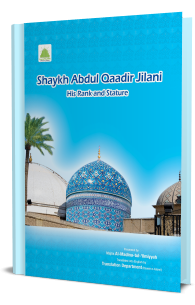Ghaus al-A’zam and the revival of Deen
Maulana Mun’im Attari Madani
Having a variety of names and titles is the evidence of an individual possessing a host of attributes and qualities. Sayyidi Ghaus al-A’zam, Shaykh Abd al-Qaadir Jeelani رَحْمَةُ الـلّٰـهِ عَـلَيْه is one of those figures whose global renowned reputation encompasses a spectrum of titles and appellations. Ghaus-e-Samdaani, Mahboob-e-Subhani, Qindeel-e-Noorani, Shahbaz-e-Laa Makani, Ghaus al-A’zam, ‘غوثُ الاِنْسِ وَالْجَان’, and ‘مُحْیُ الْمِلَّةِ وَالدِّیْنِ وَالْاِیمان’ are from the exemplary titles spoken for this prestigious personality.
From amongst his titles, he is referred to as مُحْیُ الدِّیْنِ. In description, this entails being one who revived the Deen, empowering and spreading its message. This title, when used in context with Ghaus al-A’zam himself, carries a wide horizon of varied meanings and possibilities. Sayyidi Ghaus al-A’zam adopted a pivotal role in the publication of religious texts as well as the spreading of the message of Islam. He utilized a variety of approaches and methods in reviving the practice of actions found in Islamic tradition. Let’s now study a handful of these aforementioned methods.
Reviving Deen through good character
Ghaus al-A’zam رَحْمَةُ الـلّٰـهِ عَـلَيْه himself is an embodiment of truthfulness and uprightness, possessing sublime character and heartfelt concern for the needy. He never allowed lying to enter any facet or phase of his life, even when as a child, he was approached by robbers desiring to steal from him. Upholding the truth, he revealed to them that he carried forty dinars, in spite of the potential danger this involved. He also had such care for the poor that on one occasion, a poor man intended to journey across a river, but did not possess enough money to pay for his boat fare, and thus, the sailor of the boat did not allow entry to him. Upon acquiring knowledge of this, Ghaus al-A’zam رَحْمَةُ الـلّٰـهِ عَـلَيْه sent thirty dinars as payment himself, and stated: ‘From now, do not say no to any poor individual who wants to cross the river.’[1]
Reviving Deen through changing mindsets
For a long period of time, Ghaus al-A’zam رَحْمَةُ الـلّٰـهِ عَـلَيْه saved the masses from misguidance by means of his statements and delineating a change in mindset, promoting internal reflection and contemplation. Gatherings held under his supervision were a treasure of advice, education, and admonishment, with many of those who were previously misguided becoming rectified by means of such. Within his gatherings, a wide array of people from a host of demographics would be seen in attendance, with scholars and jurists also in attendance. At one time, 400 people would gather with pens and inkpots, and studiously write down his words of wisdom. In this fashion, Ghaus al-A’zam delivered these Madani pearls of knowledge and wisdom to the people for forty years.[2]
Reviving Deen through (saintly) miracles
Ghaus al-A’zam's رَحْمَةُ الـلّٰـهِ عَـلَيْه miracles reach the extent of mass transmission, as in, they were witnessed by so many that they cannot be falsified or denied. The scholars universally agree that the number of miracles that became apparent from him are not found with any other possessor of sainthood.[3]
Reviving Deen through speeches and advice
Furthermore, via speeches and propagation, Ghaus al-A’zam رَحْمَةُ الـلّٰـهِ عَـلَيْه undertook countless tasks in the service of Islam. There was not a speech of his, except within it, people would accept Islam. Thieves, criminals, transgressors and sinners would repent upon his hand.[4] His practice was to speak publicly three times a week, and countless scholars and virtuous individuals would attend. It is narrated pertaining to the number of people who would attend these gatherings that upwards of 70,000 people could be found in attendance. From amongst them, esteemed scholars and jurists of Iraq, and religious and spiritual elders could also be found.[5]
Reviving Deen through teaching
He رَحْمَةُ الـلّٰـهِ عَـلَيْه would educate others in thirty branches of Islamic knowledge. Within his madrassa, people would learn Tafseer (Exegesis of the Holy Quran), hadith, jurisprudence, theology, principle and grammar from him. After Zuhr prayer, he would teach the Holy Quran with Tajweed, as well as its various methods of recitation.[6]
Reviving Deen through writing books
In service of Islam and to rectify the Muslim nation, he رَحْمَةُ الـلّٰـهِ عَـلَيْه penned a host of books and literary content. Allamah Ala al-Deen Baghdadi رَحْمَةُ الـلّٰـهِ عَـلَيْه writes the names of seven books of Ghaus al-A’zam رَحْمَةُ الـلّٰـهِ عَـلَيْه in his booklet, namely, Tazkira Qadiriyyah. After doing so, he mentions that the most reliable narration regarding the entirety of books written by Ghaus al-A’zam رَحْمَةُ الـلّٰـهِ عَـلَيْه is sixty-nine.[7]
Reviving Deen through issuing religious edicts (fatwa)
In the field of issuing religious rulings, Ghaus al-A’zam رَحْمَةُ الـلّٰـهِ عَـلَيْه was a possessor of such perfection and knowledge that his contemporary scholars, jurists and legal experts in Islamic rulings were left in wonder at his insight, giving indelibly easy to understand answers to complicated topics and issues. He spent numerous years in teaching, writing, issuing religious edicts and serving the religion. During his time, whenever his Fatawa would be taken to the scholars of Iraq, they would also express awe at the excellence of his answers.
May Allah Almighty, for the sake of Ghaus al-A’zam رَحْمَةُ الـلّٰـهِ عَـلَيْه, allow us the honour of ardently serving the religion of Islam.
اٰمِیْن بِجَاہِ النَّبِیِّ الْاَمِیْن صَلَّی اللہ تَعَالٰی عَلَیْہِ وَاٰلہٖ وَسَلَّم
Articles

Having a variety of names and titles is the evidence of an individual possessing a host of attributes and qualities

It was a blessed night in Muharram 1331 AH when a righteous young scholar of Islam was resting in Madina.














Comments